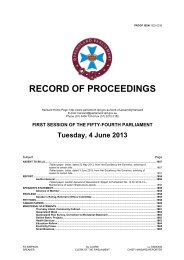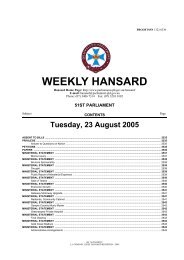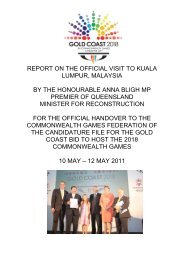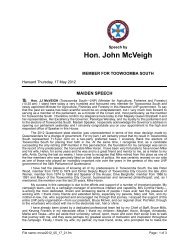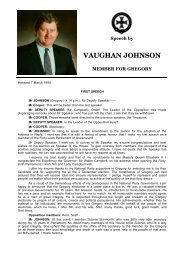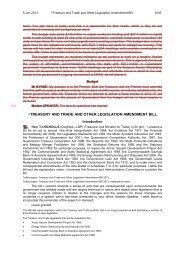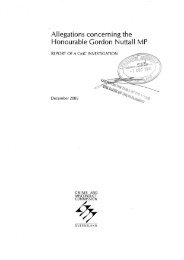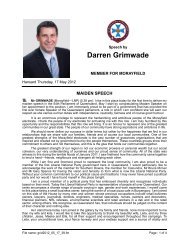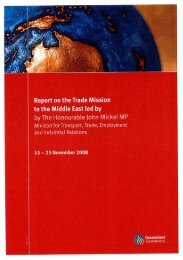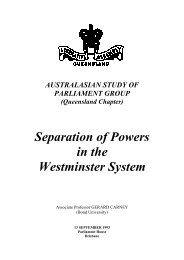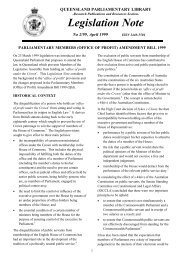Full transcript - Final - Queensland Parliament - Queensland ...
Full transcript - Final - Queensland Parliament - Queensland ...
Full transcript - Final - Queensland Parliament - Queensland ...
Create successful ePaper yourself
Turn your PDF publications into a flip-book with our unique Google optimized e-Paper software.
9 Mar 1999 Community-Based Referendum Bill 307<br />
North Sydney Council responded when they<br />
knew that not only would they be treated with<br />
respect, they knew that they would be listened<br />
to and could vote on and decide issues that<br />
they considered important. In consequence,<br />
North Sydney boomed. Not only were<br />
important community assets not sold off, there<br />
was no need for them to be sold off. In fact,<br />
rates were able to come down, with community<br />
services going up because people—real<br />
people—were being listened to.<br />
There are very important reasons why the<br />
process set out in this Bill is very important for<br />
re-establishing community confidence in our<br />
institutions. The last <strong>Queensland</strong> election saw<br />
vast numbers of electors so disenchanted that<br />
they voted for a change towards more<br />
accountability. They also voted to have a direct<br />
say on matters that needed to be addressed<br />
and that were not being addressed by the<br />
Legislative Assembly. The election result<br />
should have come as no surprise. The people<br />
felt that they had been ignored for far too long,<br />
and that no one was really listening to them or<br />
to their genuine community concerns. Unless<br />
the process of participatory democracy is<br />
available to enable the electors, where<br />
necessary, to have a direct vote on matters<br />
that they consider important, it will not be long<br />
before we see a repeat of the situation in New<br />
South Wales where one ballot paper will be<br />
the size of seven newspaper tabloid pages in<br />
present estimations.<br />
Many people believe that they are not<br />
being heard. Under the processes provided by<br />
this Bill, electors will have the opportunity to<br />
determine whether there is sufficient<br />
community concern for a common legislative<br />
proposal. Presently, genuine community<br />
concern is often ignored by elected<br />
representatives and the administration for<br />
various reasons. The biggest concern is the<br />
deficit in democracy. To quote the words of a<br />
famous <strong>Queensland</strong> Premier, this Bill will<br />
enable the "free and direct expression of the<br />
will of the people". He could not have said it<br />
clearer.<br />
This proposal to recognise democracy is<br />
not new to <strong>Queensland</strong>. It lies at the very heart<br />
of democracy. There is an urgent need to<br />
reassure the people of this State that they will<br />
be heard, and taken seriously, that the<br />
community is more important than unelected<br />
lobby groups, etc., and that there is a need to<br />
provide for balanced and necessary input from<br />
the community—the real people. There is no<br />
substitute for democracy. There are<br />
alternatives to it, none of them satisfactory.<br />
It goes without saying that representative<br />
democracy cannot really work if any unelected<br />
organisation can come between the elected<br />
representative of the people of the electorate,<br />
their parliamentary representative and<br />
themselves. If passed, this Bill will carry forward<br />
the democratic ideals and visions of a<br />
democracy which inspired the great T. J. Ryan,<br />
who had a profound confidence in the good<br />
sense and good judgment of the people.<br />
The Popular Initiative and Referendum Bill<br />
1917 was passed in this very Assembly not<br />
merely once but more than once, and the then<br />
Legislative Council also passed it with some<br />
amendments. These amendments did not<br />
affect the ordinary application of its provisions.<br />
Similar Bills were also passed in 1913 in the<br />
Western Australian Legislative Assembly, and<br />
in 1916 in the South Australian House of<br />
Assembly, only to be knocked back by the<br />
Upper Houses, which in those days opposed<br />
the concept of direct democracy.<br />
This Bill in effect recognises the Upper<br />
House of the people themselves directly,<br />
providing the necessary checks and balances<br />
from the community and ensuring community<br />
access to the democratic process, as the<br />
community does not surrender its democratic<br />
rights. Quite simply, if the required number of<br />
electors sign a popular request, this is<br />
evidence of substantial community concern.<br />
The requirement to submit verified monthly<br />
returns to the Electoral Commission<br />
demonstrating the quantity of support or lack<br />
of it will enable both the public and<br />
parliamentarians alike to assess the popularity<br />
or degree of support for the legislative<br />
proposal. This assessment may well lead to<br />
the <strong>Parliament</strong> addressing the issue before a<br />
referendum is held—a process that will<br />
enhance the democratic and parliamentary<br />
process. The whole of the process will reinforce<br />
open government in a democracy.<br />
Mr Terry Gygar, a former member of this<br />
Assembly, made a personal investigation of<br />
the process and reported its beneficial<br />
contribution to good government in<br />
Switzerland, where the <strong>Parliament</strong> benefited<br />
from being credibly informed of genuine<br />
community concerns, demonstrated by the<br />
signing of the required number of electors. He<br />
reported that 60% of proposals saw legislative<br />
or appropriate action being taken to address<br />
these community concerns, with the result that<br />
no referendum was necessary.<br />
The same process is what democratically<br />
spirited people of this State want to see. This<br />
is the only way in which there can be free and<br />
direct expression of the will of the people on



